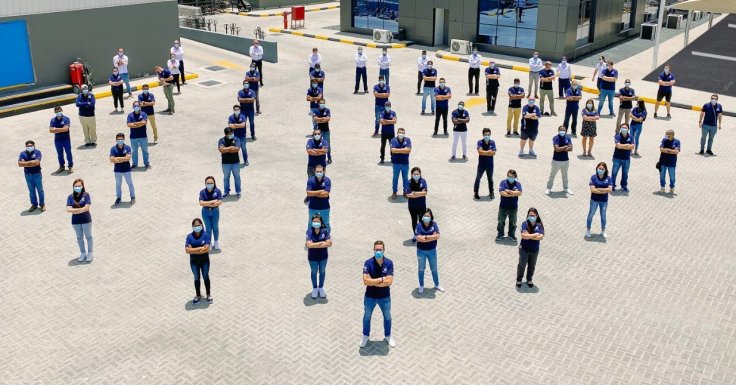
The events sector has been one of the hardest hit in the recent pandemic. In the United Arab Emirates, a global hub and popular destination for international conferences, the Ai Everything x Restart Dubai Summer Conference held in July at the Dubai World Trade Centre (DWTC) was the first in-person event to be held for four long months since the pandemic shutdown of in-person events began.
As the rest of the world joins Dubai in a cautious restart of a global calendar of mega-events, the prospect of a protracted pandemic postponing events for much longer than anticipated is leaving many asking how - and if - the events industry will survive into the future.
Arena Events Group (ARE), a global temporary event solutions player headquartered in the UK, has cited "uncertainty over the likely duration of the disruption", with significant postponements and cancellations caused by the coronavirus outbreak. With unprecedented demand for their services at the beginning of 2020 - and their largest-ever confirmed pipeline of events and projects in the company's history - Arena Group, a publicly-listed company, has since implemented a significant cost reduction programme including temporary lay-offs, reduced working hours and either partial or full salary reductions, along with a corresponding drop in share price, from a late-January high of 27.00 GBP to an early-October value of 5.40 GBP.
Other players are introducing significant cost-cutting measures and merging regional operations in EMEA to continue operations, while others are forming strategic alliances to navigate the challenging times by subcontracting work to each other - a way to spread both the risks and rewards and continue to build and support the events ecosystem.
Al Laith, a leading construction services and events overlay company in the Middle East is facing the pandemic head-on, revolutionising the temporary events space by deploying Internet of Things (IoT) solutions originally developed for the oil & gas industry. The team at Al Laith are also exploring the future of events in the new normal, as well as developing a suite of innovative technology solutions that align with the future realities of physical events, as well as the dominant rise of remote work and virtual events.
Jason English, South African entrepreneur and CEO of Al Laith, saw the writing on the wall long before the effects of the pandemic were being felt by the business community.
"We saw that the pandemic situation - compounded by technology advancement - was going to have an impact, not only on our business of today but on our business in the future. We needed to be prepared to ask ourselves some challenging questions about what our events business will mean in a world where physical events are increasingly complemented by virtual experiences, and how we could adopt technology to be more efficient and offer a wider range of offerings to the markets."
Al Laith, a member company of the CG Tech Group, has an ace up its sleeve that the competitors don't – access to CG Tech's internal skunkworks, The Virtulab.
Building cutting edge digital technologies, The Virtulab is CG Tech's technology incubator and digital support team. The Virtulab leverages the latest digital innovations in virtual reality and augmented reality, machine learning, and drone technology to create value for analogue industries in South Africa, the United Kingdom, the UAE and around the world. The value proposition? Offering a suite of so-called "digital solutions to analogue problems" across the CG Tech portfolio of companies.
Led by David Cummins and supported by fellow Director Wayne Strydom, the products and platforms that emerge from The Virtulab enable customers to engage with their physical world virtually and digitally, enabling virtual and remote work and planning.
At first glance, the idea of creating a product in direct competition with another company in the portfolio would seem counterintuitive, but CG Tech group chairman Niall Carroll advocates precisely the opposite. And for very good reason. The CG Tech group already has plenty of experience entering traditional and outmoded sectors, leveraging cutting-edge technologies to create disruptive new business models and displacing established competitors in the process.
"For CG Tech's oil and gas services business Prommac, led by Dany De Barros, the team at The Virtulab repurposed advanced drone technology to increase the efficiency of oil and gas infrastructure inspections, and created virtual reality simulation programs for their petrochemical engineers to train on."
A disruptive mindset is shared by Jason English, paraphrasing the famous Steve Jobs quote; "If you don't cannibalise yourself, someone else will."
"It's about survival. Surviving, and indeed thriving in business in today's times requires a shift in mindset. When we revisited our customer value proposition and looked honestly and openly at the future of the events industry and the role we wanted to play in it, we wanted to emerge from the pandemic in a stronger position than how we entered it. It only made sense to hedge against the possibility that the future of events would be increasingly virtual."
The Virtuworx platform, an avatar-based hybrid of virtual reality and mixed reality environments that are fully customisable and white labelled for virtual training, virtual offices, virtual events, virtual education, virtual trade shows and virtual conferences. Virtuworx allows companies to be more productive and more engaged in remote working and working from home contexts.
With Virtuworx, the group is making a bet that the future of events is one which blends the physical and digital realms, creating human connections through virtual experiences. And there is a benefit to be had by all, saving time, money and reducing the global carbon footprint whilst opening up attendance to a whole new group of remote participants and increasing value for event organisers.
Niall Carroll adds: "A great example of a company that didn't cannibalise itself is Kodak, and we have the benefit of history to see how that worked out for them. At CG Tech, we try to learn lessons from the past, in order to help us navigate an uncertain future."








